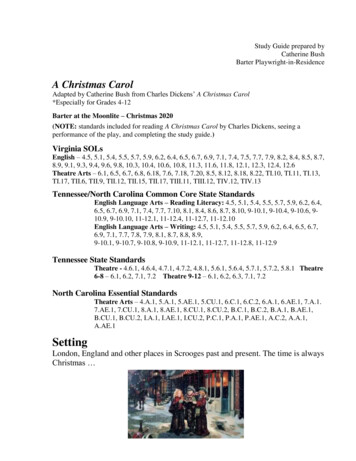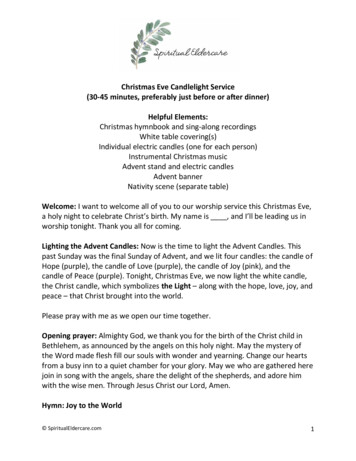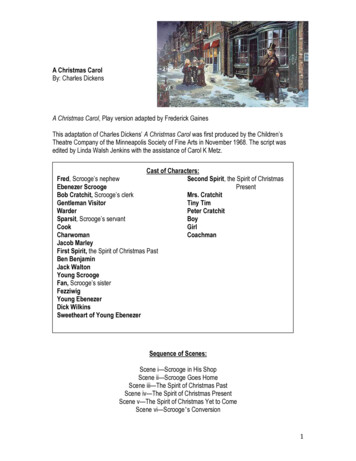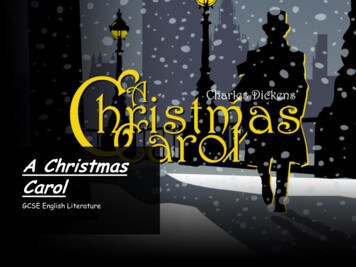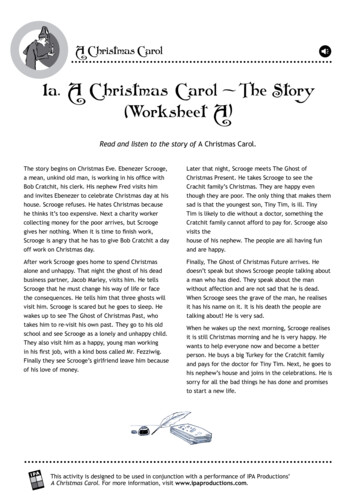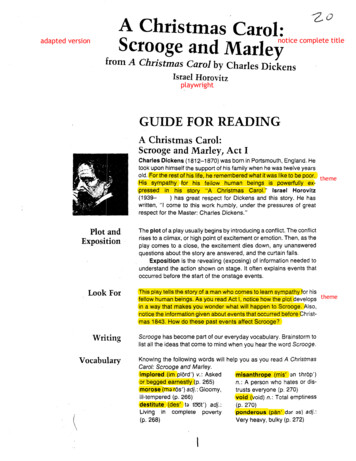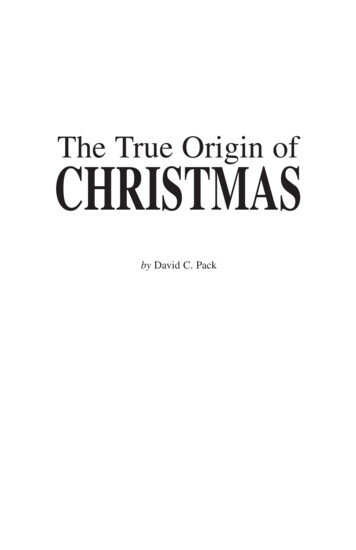
Transcription
The True Origin ofCHRISTMASby David C. Pack
Herbert W. Armstrong led the Worldwide Church of God (formerly TheRadio Church of God until 1968) until his death in 1986. Hundreds of millions heard his voice and read his literature. God called him in the fall of1926 and he was converted in the spring of 1927. Over the course of Mr.Armstrong’s ministry, God revealed through him a great many true biblicaldoctrines, which had been lost to the Church through the centuries. After hisdeath, his successors ceased to believe and teach these doctrines. Althoughcopyright law prohibits The Restored Church of God from reproducing anddistributing literature produced while he led the Worldwide Church of God,we are committed to the preservation and teaching of all of these truths!THIS BOOKLET IS PROVIDED FREE OF CHARGE AND IN THEPUBLIC INTEREST BY THE RESTORED CHURCH OF GOD.It is made possible by the voluntary, freely given tithes and offerings of the members of the Church and others who have elected to support the work of theChurch. Contributions are welcomed and gratefully accepted. Those who wish tovoluntarily aid and support this Work of God around the world are gladly welcomed as co-workers in this major effort to preach the gospel to all nations.Copyright 2008, 2011, 2017 The Restored Church of God All Rights Reserved.Printed in the United States of America
Where did Christmas originate? From theBible or paganism? What is the real originof Santa Claus—mistletoe—Christmastrees—holly wreaths—and the custom ofexchanging gifts? Many are concernedabout putting “Christ back into Christmas.”Was He ever there? Here are the stunninganswers!
The True Origin of ChristmasE5very year after Thanksgiving, most people’s thoughts turn to Christmas.It is the time when professing Christians are supposed to focus on JesusChrist. After all, it is the “Christ-mass” season!Rudolph the Red-nosed Reindeer, holly wreaths, decorated trees, mistletoe,season’s greetings, seasonal music, “chestnuts roasting on an open fire” andSanta Claus are all associated with this holiday. These all bring warm feelingsto those who celebrate it.I grew up in a family that kept Christmas, and it was a very big event inour household every year. We left out none of the usual trimmings of thisoccasion. On December 24th, excitement grew with every passing minute.My parents even brewed black coffee for Santa just before sending us off tobed. I always wondered how they knew Santa liked his coffee black—justlike my parents liked theirs. After going to bed on Christmas Eve, I couldneither sleep nor wait to get up in the morning to see all that “Santa” hadbrought me.Christmas is thought by most to be a wonderful time, focusing the participants on giving, family togetherness, beautiful music and decorations, feastingon special foods and singing Christmas carols throughout the neighborhood (asmy family did every year). All of this is supposedly centered around the worship of Christ. Surely the Bible instructs us to do all this—right?The answers will shock you!Why do people think that Christmas is wonderful? It certainly felt wonderful to me. I trusted what my parents told me. I had no reason to doubt them.
6The True Origin of ChristmasThey were merely teaching me what their parents had taught them. I neverquestioned the true origin of Christmas—or what God says about it!Most never reflect on why they believe what they believe or do what theydo. We live in a world filled with customs, but few ever seek to understandtheir origin. We generally accept them without question. Most people basicallydo what everyone else does—following the crowd because it is easy!Let’s carefully examine the roots of Christmas. Let’s look at why peoplefollow the customs associated with it. Why is it kept on December 25th? Didthe early New Testament Church keep it? This booklet is filled with facts fromhistory and Scripture that, when placed together, paint a complete picture. Let’savoid all assumptions and only accept what can be proven!Pagan OriginIn 1990, the Solon, Ohio (a Cleveland suburb) school board banned all nativityand other Christmas scenes on any school property because they felt it violatedthe separation of church and state. They were challenged in court when outragedparents opposed them, feeling that Christmas was being stolen from their children and the community. The board lost the case! The citizenry had contendedthat Christmas was a worldwide tradition that was not part of, and transcended,religion. It was deemed to be secular—a part of virtually all cultures worldwide.The court decision affirmed that Christmas has no Christian roots! However,the court’s opinion also noted that Bible reading and prayer obviously are associated with Christianity—a remarkable admission! The court concluded thatChristmas-keeping and manger scenes could remain because they are not reallypart of either Christianity or religion—but prayer and Bible reading, which are,must remain excluded from schools!Nearly all aspects of Christmas observance have their roots in Roman customand religion. Consider the following admission from a large American newspaper (The Buffalo News, Nov. 22, 1984): “The earliest reference to Christmasbeing marked on Dec. 25 comes from the second century after Jesus’ birth. It isconsidered likely the first Christmas celebrations were in reaction to the RomanSaturnalia, a harvest festival that marked the winter solstice—the return of thesun—and honored Saturn, the god of sowing. Saturnalia was a rowdy time,much opposed by the more austere leaders among the still-minority Christiansect. Christmas developed, one scholar says, as a means of replacing worship ofthe sun with worship of the Son. By 529 AD, after Christianity had become theofficial state religion of the Roman Empire, Emperor Justinian made Christmasa civic holiday. The celebration of Christmas reached its peak—some would sayits worst moments—in the medieval period when it became a time for conspicuous consumption and unequaled revelry.”Consider these quotes from the Catholic Encyclopedia, 1911 edition, under“Christmas”: “Christmas was not among the earliest festivals of the Church The first evidence of the feast is from Egypt.” Further, “Pagan customs cen-
The True Origin of Christmas7tring round the January calends gravitated to Christmas.” Under “Natal Day,”Origen, an early Catholic writer, admitted, “ In the Scriptures, no one isrecorded to have kept a feast or held a great banquet on his birthday. It is onlysinners (like Pharaoh and Herod) who make great rejoicings over the day onwhich they were born into this world” (emphasis mine).The Encyclopedia Americana, 1956 edition, adds, “Christmas was notobserved in the first centuries of the Christian church, since the Christian usagein general was to celebrate the death of remarkable persons rather than theirbirth a feast was established in memory of this event [Christ’s birth] in the4th century. In the 5th century the Western church ordered the feast to be celebrated on the day of the Mithraic rites of the birth of the sun and at the closeof the Saturnalia, as no certain knowledge of the day of Christ’s birth existed.”There is no mistaking the origin of the modern Christmas celebration.Many additional sources could be cited and we will return to this later. Let’sbegin to tie some other facts together.It was 300 years after Christ before the Roman church kept Christmas, andnot until the fifth century that it was mandated to be kept throughout the empireas an official festival honoring “Christ.”Can Christ be Honored by Christmas?The most common justification that one will hear regarding Christmas is thatpeople have replaced old pagan customs and intents by asserting that theyare now “focusing on Christ.” I have heard many say that they are “honoring Christ” in their Christmas-keeping. The problem is that God does not saythis is acceptable to Him! Actually, He plainly commands against it! KeepingChristmas dishonors Christ! He considers everything about it to be an abomination! We will soon see why.Christ said, “But in vain they do worship Me, teaching for doctrines thecommandments of men” (Matt. 15:9). Christmas is not a command of God—itis a tradition of men. Christ continued, “Full well you reject the commandment of God, that you may keep your own tradition” (Mark 7:9). Every year,throughout the world, on December 25th, hundreds of millions do just that!We will see that God plainly commands, “Follow not the way of the heathen.” But most people do not fear God, and He allows them to make their owndecisions. Human beings are free moral agents—free to obey or disobey God!But woe to those who ignore the plain Word of God!Was Christ Born on December 25th?Christ was born in the fall of the year. Many have mistakenly believed Hewas born around the beginning of winter—December 25th! They are wrong!Notice the Adam Clarke Commentary, volume 5, page 370, New York edition: “It was custom among Jews to send out their sheep to the deserts about
8The True Origin of Christmasthe Passover [early spring], and bring them home at the commencement ofthe first rain.” The first rains began in early-to-mid fall. Continuing with thissame quote: “During the time they were out, the shepherds watched themnight and day. As the first rain began early in the month of March-esvan,which answers to part of our October and November [begins sometime inOctober], we find that the sheep were kept out in the open country duringthe whole summer. And as these shepherds had not yet brought home theirflocks, it is a presumptive argument that October had not yet commenced,and that, consequently, our Lord was not born on the 25th of December,when no flocks were out in the fields; nor could He have been born laterthan September, as the flocks were still in the fields by night. On this veryground, the nativity in December should be given up. The feeding of theflocks by night in the fields is a chronological fact See the quotations fromthe Talmudists in Lightfoot.”Luke 2:8 explains that when Christ was born, “And there were in the samecountry shepherds abiding in the field, keeping watch over their flock bynight.” Note that they were “abiding” in the field. This never happened inDecember. Both Ezra 10:9-13 and the Song of Solomon 2:11 show that winter was the rainy season and shepherds could not stay on cold, open fieldsat night.Numerous encyclopedias plainly state that Christ was not born onDecember 25th! The Catholic Encyclopedia directly confirms this. In alllikelihood, Christ was born in the fall! A lengthy technical explanation wouldprove this point.Since we now know that December 25th was nowhere near Christ’s actualbirthdate, where did the festival associated with this date come from?Now read this quote under “Christmas”: “In the Roman world theSaturnalia (December 17) was a time of merrymaking and exchangingof gifts. December 25 was also regarded as the birthdate of the Iranianmystery god Mithra, the Sun of Righteousness. On the Roman New Year(January 1), houses were decorated with greenery and lights, and giftswere given to children and the poor. To these observances were addedthe German and Celtic Yule rites when the Teutonic tribes penetrated intoGaul, Britain and central Europe. Food and good fellowship, the Yule logand Yule cakes, greenery and fir trees, gifts and greetings all commemorated different aspects of this festive season. Fires and lights, symbolsof warmth and lasting life, have always been associated with the winterfestival, both pagan and Christian” (Encyclopaedia Britannica, 15th Edit.Vol. II, p. 903).A final quote about the selection of December 25th as the birthdate ofChrist is necessary. Note an article in The Toronto Star, December 1984, byAlan Edmonds, entitled, “We owe a lot to Druids, Dutch”: “The Reformationcast a blight on Christmas. By then, of course, clever ecclesiastical politicians had adopted the Pagan mid-winter festival as the alleged birthdate of
9The True Origin of ChristmasJesus, of Nazareth, and thrown in a few other Pagan goodies to make theirtakeover more palatable.”December 25th was not selected because it was the birth of Christ orbecause it was even near it. It was selected because it coincided with the idolatrous pagan festival Saturnalia—and this celebration must be carefully examined. In any event, we do not know the exact date of Christ’s birth. While Godcertainly could have made it known, He chose to hide it from the world’s eyes!Who Was Saturn?Previous quotes introduced the subject of the Saturnalia. Let’s carefully studyjust exactly who Saturn was. Consider the following quote from another largeAmerican newspaper, The Democrat and Chronicle, Rochester, New York,December 1984: “The Roman festival of Saturnalia, Dec. 17-24, moved citizens to decorate their homes with greens and lights and give gifts to childrenand the poor. The Dec. 25 festival of natalis solis invicti, the birth of theunconquered sun, was decreed by the emperor Aurelian in AD 274 as a WinterSolstice celebration, and sometime (later) was Christianized as a date to celebrate the birth of the Son of Light.”Dr. William Gutsch, chairman of the American Museum of NaturalHistory—Hayden Planetarium, further confirmed the original name ofChristmas with this quote on December 18, 1989, in a Westchester, New York,newspaper, The Reporter Dispatch:“The early Romans were not celebrating Christmas but rather a pagan feastcalled the Saturnalia. It occurred each year around the beginning of winter, orthe winter solstice. This was the time when the sun had taken its lowest pathacross the sky and the days were beginning to lengthen, thus assuring anotherseason of growth.“If many of the trappings of the Saturnalia, however, seem to parallel whatso many of us do today, we can see where we borrowed our holiday traditions. And indeed, it has been suggested that while Christ was most likely notborn in late December, the early Christians—then still an outlawed sect—moved Christmas to the time of the Saturnalia to draw as little attention aspossible to themselves while they celebrated their own holiday.”The Saturnalia, of course, celebrated Saturn—the fire god. Saturday derivesfrom the name of this god, as do all the other days of the week from pagangods—Sun’s day, Moon’s day, Twis’ day, Woden’s day, Thor’s day, Frigga’sday and Saturn’s day. But who was Saturn? He was the god of sowing (planting) because heat from the sun was required to allow for planting and growthof crops. He was also worshipped in this dead-of-winter festival so that hewould come back (he was the “sun”) and warm the earth again so that springplanting could occur. The planet Saturn was later named after him because,among all of the planets, with its rings and bright red color, it best representedthe god of fire!
10The True Origin of ChristmasVirtually every civilization has a fire/sun god. The Egyptians (and sometimes Romans) called him Vulcan. The Greeks named him Kronos, as did thePhoenicians—but they also called him Saturn. The Babylonians called himTammuz, Molech or Baal, as did the Druids. These were all simply the various names for Nimrod, the infamous biblical rebel of Genesis 10. Nimrod wasconsidered the father of all the Babylonian gods.Child SacrificeNotice this horrible practice associated with the worship of the fire god(Nimrod, Saturn, Kronos, Molech and Baal) in the following quote from TheTwo Babylons, Alexander Hislop, page 231:“Now, this is in exact accordance with the character of the Great Head ofthe system of fire-worship. Nimrod, as the representative of the devouring fireto which human victims, and especially children, were offered in sacrifice, wasregarded as the great child-devourer he was, of course, the actual father ofall the Babylonian gods; and, therefore, in that character he was afterwardsuniversally regarded. As the Father of the gods, he was, as we have seen, calledKronos; and every one knows that the classical story of Kronos was just this,that, ‘he devoured his sons as soon as they were born.’ (Lempriere ClassicalDictionary, ‘Saturn.’) This legend has a further and deeper meaning; but, asapplied to Nimrod, or ‘The Horned One,’ it just refers to the fact, that, as therepresentative of Moloch or Baal, infants were the most acceptable offeringsat his altar. We have ample and melancholy evidence on this subject from therecords of antiquity. ‘The Phoenicians,’ says Eusebius, ‘every year sacrificedtheir beloved and only-begotten children to Kronos or Saturn.’”But why was human sacrifice such a key to the worship of this terriblegod? What possible good could human beings think they saw in slaughtering their own children? Continuing: “ he who approached the fire wouldreceive a light from divinity” and “through divine fire all the stains producedby generations could be purged away.” Therefore, “children were made topass through the fire unto Molech” (Jer. 32:35).As incredible as it seems, deceived human beings actually believed theywere pleasing their “god” by sacrificing their own innocent little children tohim. They believed fire purified them from original sin. The pagan doctrine ofspending time in purgatory to purge the soul from all sin derives from this belief!Who Was Nimrod?We must now look more closely at who this biblical figure, Nimrod, was. Wehave already seen him as one of history’s original false gods, but what else canbe learned?Genesis 10:9 says of Nimrod, “He was a mighty hunter before [in placeof] the Lord.” He actually tried to replace God.
11The True Origin of ChristmasThe famous Jewish historian, Josephus, records in Jewish Antiquitiesimportant evidence of Nimrod’s role in the post-flood world. Notice: “Healso gradually changed the government into tyranny He [Nimrod] also saidhe would be revenged on God, if He should have a mind to drown the worldagain; for that he would build a tower too high for the waters to be able toreach Now the multitude were very ready to follow the determination ofNimrod, and to esteem it a piece of cowardice to submit to God” (Bk. I, Ch.IV, sec. 2, 3).Under many names, mankind’s earliest and perhaps greatest rebel has beenworshipped throughout false religion. Ancient Israel kept falling into servingthe many false gods that Nimrod represented.Ezekiel 8:13-14 records a picture of the women of Israel “weeping forTammuz.” This Tammuz (the god of fire) was considered to be Nimrod andthe etymology of the word itself is fascinating. Tam means “to make perfect”and muz “fire.” The meaning is clear in light of what we have already learned.Incidentally, in the Iraqi-Kuwaiti Desert Storm War, Saddam Hussein evennamed one of his missiles the “Tammuz.” He certainly understood that itsmeaning included fire.Burned to MolechLet’s see how God’s people, Israel, worshipped Baal/Molech once they haddeparted from the true God: “And they built the high places of Baal, which arein the valley of the son of Hinnom, to cause their sons and their daughters topass through the fire unto Molech; which I commanded them not, neither cameit into My mind, that they should do this abomination ” (Jer. 32:35).Notice that God Himself says that such horrible abominations never evenentered His mind: “They have built also the high places of Baal, to burn theirsons with fire for burnt offerings unto Baal, which I commanded not, nor spokeit, neither came it into My mind: Therefore, behold, the days come, says theLord, that this place shall no more be called Tophet, nor The valley of the sonof Hinnom, but the valley of slaughter” (Jer. 19:5). Verse 6 ties the valley ofTophet or Hinnom to this practice. Jeremiah 7:31 connects Tophet and Hinnomto child sacrifice. Tophet means “the drum.” Drums were played to drown thescreams of victims in the flames.Notice this quote from Paradise Lost, by John Milton, about the terriblegod Molech: “First Moloch, horrid king besmear’d with blood Of human sacrifice, and parents tears, Though, for the noyse of Drums and Timbrels loudTheir children’s cries unheard, that passed through fire To his grim Idol.” Ofcourse, everyone will say that they do not sacrifice their children to Molechtoday, but read on.In the New Testament, the martyr Stephen was stoned to death, at leastpartly, because he indicted his listeners for the worship of this evil idol (Acts7:43).
12The True Origin of ChristmasWhen righteous King Josiah came to the throne, as king of Judah, hedestroyed the altars in the Valley of Tophet (or Hinnom—the very same valleyChrist likened to “gehenna” fire in Mark 9:43-49) soon after coming to power.He realized the great evil of the practices taking place there.The Druids and Human SacrificeMany people have heard of the Druids. Few know who and what they were. Wewill refer to them later and tie them to other well-known Christmas practices. Wemust first establish their historic role in human sacrifice.Julius Caesar is the best-known source of information about the Druids. Thiscomes from the Encyclopaedia Britannica. This quote, under “Druids,” clearlyexplains who they were: “Druids, the learned class among the ancient Celts,whose name means Knowing (or Finding) the Oak Tree. They seem to have frequented Oak forests and acted as priests, teachers and judges. The earliest knownrecords of the Druids come from the 3rd century [B.C.] Druids took charge ofpublic and private sacrifices, and many young men went to them for instruction.They judged all public and private quarrels and decreed the penalty The Druidsprinciple doctrine was that the soul was immortal (they) offered human victimsfor those who were gravely sick or in danger of death in battle. Huge wickerworkimages were filled with living men and then burned; although the Druids chosecriminals by preference, they sacrificed innocent victims if necessary.”The Old Testament is filled with God’s condemnation of Israel for practicingthe customs of the nations around them—and we are gathering important factsrevealing a shocking picture. (To learn more about this subject, read our bookletGod’s Holy Days or Pagan Holidays?)The Role of CannibalismAnother truth about the origin of Christmas springs from the modern word cannibal. This practice has its roots in a prime function of all priests of Baal. Keepin mind that the Hebrew word for priest is Cahn.Consider the following quote from The Two Babylons, by Alexander Hislop,page 232: “And it was a principle of the Mosaic law, a principle no doubt derivedfrom the patriarchal faith, that the priest must partake of whatever was offered asa sin-offering (Numbers xviii. 9, 10). Hence, the priests of Nimrod or Baal werenecessarily required to eat of the human sacrifices; and thus it has come to passthat ‘Cahna-Bal,’ the ‘Priest of Baal,’ is the established word in our own tonguefor a devourer of human flesh.”The reality of this can be lost on no one! It is also true that most civilizationshave a tradition that has involved cannibalism. Notice this statement from TheNew York Times, “What Is the Meaning of Cannibalism?” by Erik Eckholm:“Cannibalism has once fascinated and repelled virtually every known society,including those said to have practiced it.”
The True Origin of Christmas13This same article went on to show that most civilizations also attached divinesignificance to its practice.What About the Santa Myth?Have you considered that you could also be burning, even sacrificing, yourchildren today (though in a different way) in your practice of Christmas, whileyou may be trying to sincerely “focus on Christ”?Parents reason that they owe the whole Christmas myth to their children!Christmas traditions are focused primarily on kids, and they are certainly thecenter of most of what happens. I know because I kept seventeen Christmases.My older sister and younger brother and I were the recipients of much and thegivers of very little on that day—and it all started with the Santa Claus lie.Some years ago, a priest in New Jersey told his Sunday school class thatSanta was a myth. The outrage from parents and his supervisors was swift. Hehad “killed Santa!” He had “destroyed family tradition!” He had “usurped family authority,” the article continued. He was officially censored by his superiorsfor being “overzealous and insensitive.”His crime? He told the truth!According to Langer’s Encyclopedia of World History, (article “Santa”),“Santa” was a common name for Nimrod throughout Asia Minor. This wasalso the same fire god who came down the chimneys of the ancient pagans andthe same fire god to whom infants were burned and eaten in human sacrificeamong those who were once God’s people.Today Santa Claus comes from “Saint Nicholas.” Washington Irving, in1809, is responsible for remaking the original old, stern bishop of this samename into the new “jolly St. Nick” in his Knickerbocker History of New York.(Most of the rest of America’s Christmas traditions are even more recent thanthis.) “Old Nick” has long been recognized as a term for the devil.In Revelation 2:6 and 15, we read about a “doctrine of the Nicolaitanes,”which Christ twice tells His Church “[He] hates.” Let’s analyze the wordNicolaitane. It means “follower of Nicholas.” Nikos means “conqueror,destroyer.” Laos means, “people.” Nicolaitanes, then, are people who followthe conqueror or destroyer—Nimrod. If you have believed that followingChristmas is an innocent Christian custom, let this truth sink in!Is It Scriptural to Exchange Gifts?Merchants regularly report that over 60% of their annual retail sales occur during the Christmas shopping season. This represents a tremendous amount ofgift buying. Most today believe that gift-giving comes from the Bible exampleof the “three wise men” (the Bible gives no number) presenting gifts to Christ.Is this true? Where did exchanging gifts come from, and what does God’s Wordsay about it?
14The True Origin of ChristmasThe Bibliotheca Sacra states, “The interchange of presents betweenfriends is a like characteristic of Christmas and the Saturnalia, and must havebeen adopted by Christians from the pagans, as the admonition of Tertullianplainly shows” (Vol. 12, pp. 153-155).Like every other aspect of Christmas, the shocking truth is that even thissupposed Christian custom does not come from the Bible. It is an irony thatpeople love to believe they are following the custom of the wise men givingto Christ, when actually they are giving almost exclusively to each other!What hypocrisy! Christ is completely forgotten.The Bible actually teaches that Christians should not keep birthdays.Numerous scriptures make this principle clear. (Our article “Are BirthdayCelebrations Christian?” expands on this subject.) However, what if you went toa birthday party that had been prepared for you and everybody gave gifts to eachother and you were left out? The idea is ridiculous! If this happened, you wouldsay that people were being selfish and forgetting you. In fact, most people giveto others on Christmas merely because they expect to receive gifts themselves!Let’s briefly return to the “wise men” who gave gifts to Christ. Thescripture describing this is Matthew 2:1-11: “Now when Jesus was born inBethlehem of Judaea in the days of Herod the king, behold, there came wisemen from the east to Jerusalem, saying, Where is He that is born King of theJews? And when they were come into the house, they saw the young Childwith Mary His mother, and fell down, and worshipped Him: and when theyhad opened their treasures, they presented unto Him gifts; gold, and frankincense, and myrrh.”It is commonly supposed that these were birthday presents for “baby Jesus.”But is this what the Bible actually says? Absolutely not! First, it is importantto note that they did give the gifts to Jesus. They did not stand in His presenceand exchange gifts among themselves or give them to others. The gifts were“presented unto Him.” Also, they arrived well after His “birthday.” This isanother reason these could not have been “birthday presents.”A long-standing, ancient custom of the East was to present gifts whencoming before a king. These men understood they were in the presence ofthe “King of the Jews.” The Bible carries many examples of people sendinggifts to kings or presenting them upon arrival into their presence. This customis common today when ambassadors or others come into the presence of aworld leader.Finally, notice what the Adam Clarke Commentary, volume 5, page 46,states about what really happened on this occasion: “Verse 11. They presented unto him gifts. The people of the east never approach the presenceof kings and great personages, without a present in their hands. This customis often noticed in the Old Testament, and still prevails in the east, and insome of the newly discovered South Seas Islands.” Gifts were customarilypresented to kings.What could be more plain?
The True Origin of Christmas15The Origin of the Christmas TreeNo booklet about Christmas is complete without some explanation of the“Christmas tree.” We have touched on it without directly focusing on it. Themodern Christmas tree originated in Germany. But the Germans got it from theRomans, who got it from the Babylonians and the Egyptians.The following quote demonstrates what the Babylonians believe about theorigin of the Christmas tree: “An old Babylonish fable told of an evergreentree which sprang out of a dead tree stump. The old stump symbolized thedead Nimrod, the new evergreen tree symbolized that Nimrod had come to lifeagain in Tammuz! Among the Druids the oak was sacred, among the Egyptiansit was the palm, and in Rome it was the fir, which was decorated with red berries during the Saturnalia!” (Walsh, Curiosities of Popular Customs, p. 242).Frederick J. Haskin’s book Answers to Questions states, “The Christmastree is from Egypt, and its origin dates from a period long anterior to theChristian Era.” Did you know this—that the Christmas tree long pre
Human beings are free moral agents—free to obey or disobey God! But woe to those who ignore the plain Word of God! Was Christ Born on December 25th? Christ was born in the fall of the year. Many have mistakenly believed He was born around the beginning of winter—December 25th! They a
